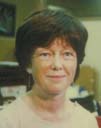Elizabeth King
(1986-90)

Now still in the country, still teaching Japanese students, I like to look back to those days of eye-opening experiences in a brand new world. LIOJ was a wonderful place for learning. Each group of teachers who had come and gone over many years had left their legacy, in the form of unique and inspired teaching materials, bright ideas, a renowned teachers' journal and in-house traditions. When I arrived there the spirit that prevailed was very akin to that of my Peace Corps days. LIOJ was not a job, it was a total immersion experience, not only for the company employees who came to the Business Program for English training, but for the staff as well. Fourteen hours in a day at Asia Center was not unusual, and many of those hours were spent in the staff room, getting ideas, sharing ideas, preparing classes, cocktail parties, sports programs and summer teachers' seminars, as well as many long sessions of writing company reports on students' progress. I had never worked so closely in a group before, and most of the time found it challenging and rewarding. Most rewarding of all, however, was learning from the students, who ranged from company freshmen to capable supervisors to presidents, all thrown together with employees from other companies, and in a new role as students of English. In those days when Japanese salarymen (and an occasional salarywoman) were still married to their companies, studying together with those from other companies was a rare and unique experience for LIOJ's students, as memorable for them as studying with their foreign teachers, most of whom, like myself, were "just off the boat" and eager to learn whatever they could about Japan.
With this unique recipe, students and teachers alike were "baked" at LIOJ for intensive four-week terms, from early morning breakfast to late-night drinking parties. The frosting on the cake came at the final banquet, where Asia Center's chef had a chance to exhibit his skill with a Western-style steak dinner, and students proudly showed their class video projects as the culmination of their hard study and cross-cultural experience. Many a Japanese businessman experienced his first night on a dance floor at the final disco party which sometimes lasted into the wee hours.
As I write this, I think of my own teaching history, and how strongly influenced it was by my three years at LIOJ. It was without a doubt the place where I really learned to teach, a debt that I can't properly repay. I had so many teachers there myself: Odawara's Community members, Business students, and an array of teachers from all over Asia who shared in the Summer Workshops. Mr. Shibusawa, the much-respected founder of Asia Center, the wonderfully kind staff, from dedicated office staff to kitchen workers. I think of it as one of the richest times in my life, and an era with a naivete and freshness and genuineness of culture meeting culture that can never be recreated. The world has changed a lot since my days at LIOJ.
May 2002
Top |
Copyright (c) Language Institute of Japan (LIOJ) / 日本外語教育研究所 |  Back Back |